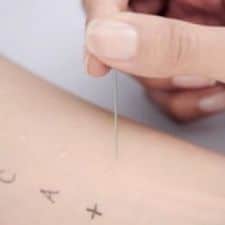Medical Writing — It's a stable career that can provide many opportunities for those interested in the medical world, however, ofttimes this profession is overlooked. Not because it's not a lucrative career choice (it most definitely is), but because typically those interested in healthcare think job titles such as doctor and nurse are the only ones available. But becoming a medical writer provides many opportunities too.
10 Reasons to Pursue a Career in Healthcare
Healthcare jobs have been a major source of employment to millions across the globe. What makes these healthcare jobs a mass drawer? Indeed, healthcare jobs have been around for ages, but the real clincher towards a career in healthcare is the recent increase in the demand for specialized healthcare providers. This resulted in a massive increase in job prospect and ensuing diversity.
The Penicillin Skin Test
Penicillin was a historically revolutionary drug. It was the first prescribed antibiotic for syphilis, streptococci and staphylococci infections. Though some viruses have over time developed resistance to penicillin, it is still preferred over wide spread antibiotics for some ailments. This jump-started research into antibiotic therapies and the refocus on transmissible agents as a cause for infections. In many ways penicillin is considered a miracle drug.
To understand the nuances in patient-care and details given here you can choose to be a nurse. Get detailedinformation about online nursing classesand how to become a nurse.
A History of Resistance
For many patients, penicillin is out of the question due to a perceived penicillin allergy. Usually this test is carried out in infancy and the diagnosis is carried without retesting for decades, if not a lifetime. A perceived history of penicillin allergy can now be more commonly tested with an easy to read skin test. The real surprising part is that most people who believe they are allergic just aren’t.
The Penicillin Skin Test
When is comes to a past history of penicillin allergy, some patients are more certain than others. Often this history is based on an adverse reaction that includes anything from a skin rash to anaphylactic shock. Subjects who reported an adverse reaction to penicillin where tested again as adults for the allergy.
Approximately 90% of test subject test negative for a penicillin allergy. It is important to note that since the margin of error is large (between 3-10%), penicillin should still not be taken for those who have had a life threatening adverse reaction. Still, this is excellent news for patients who have only vague histories of a penicillin allergy.
Desensitizing
According to the Center for Disease Control, only 10% of penicillin allergy patients will retain an allergy throughout their lives. Evidence suggests that penicillin sensitivity may decrease over time. There is also a desensitizing procedure for positive tested subjects. This involves administering small and then incrementally larger doses of penicillin in a controlled hospital setting. The procedure lasts 14 hours and is effective in most patients.
Summing Up
To sum up, if you have a history a penicillin allergy there is a good chance nothing is wrong with you. To this day, there are still a score of medical reasons to use penicillin that make it still a revolutionary drug. Take the penicillin skin test to confirm whether or not you have this allergy. It is worth a shot and the results may surprise you.

The Risks of Teen Depression
The World Health Organization (WHO) recently estimated that 1 in 4 people worldwide will need mental health care sometime during their lives.
A specific concern is the rising number of teen suicides due to untreated depression. According to experts, only 1 in 5 depressed teens receives help for their condition. Many parents and teachers may assume that moodiness in teens is just part of puberty – but it could actually be a sign of depression and should be taken seriously.
What are the Symptoms of Teen Depression?
While many of the symptoms of depression in teens are similar to adult depression, there are some specific symptoms that differ. Here are the four major differences:
- Irritability: Depressed teens are more likely to be irritable than sad. If they are depressed, they may seem easily frustrated, grumpy, or even hostile.
- Aches and Pains: Although many teens experience “growing pains,” frequent pains such as headaches or stomachaches may also be a sign of depression. If you see a physician for the problem and he or she cannot provide a medical explanation, this may be a sign that your teen is depressed.
- Sensitivity to Criticism: Many depressed teens are troubled by feelings of worthlessness. This makes them especially vulnerable to criticism, rejection, or failure.
- Selective Withdrawal: While depressed adults may isolate themselves from everyone, depressed teens are likely to maintain some of their friendships. However, it is also possible that they will start hanging out with a new friend group that engages in dangerous behavior like drinking or violence.
Additional depression symptoms common to teens and adults include feelings of sadness, worthlessness, anger, fatigue, and noticeable changes in eating, sleeping, friendship, and/or interests.
What are the Warning Signs for Suicide?
Teens considering suicide are more likely to perform actions that draw attention to themselves. They may speak about suicide or engage in reckless behavior.
Some warning signs include, but are not limited to the following:
- Saying things like “I’d be better off dead,” or “I just wish I could disappear forever.”
- Making casual comments or jokes about committing suicide.
- Romanticizing death or discussing dramatic ways to die.
- Writing stories or poems about death.
- Seeking out weapons, pills, or other means to commit suicide.
- Engaging in reckless behavior or getting frequent injuries without much care.
You should closely monitor a depressed teen in case they show any of these warning signs. Teens often exhibit such behavior as a cry for help, so the best thing you can do is talk to them about it and show that you care. If you are severely concerned that someone might commit suicide, you should call a crisis intervention hotline immediately.
Here are some crisis intervention hotlines in India that you can call:
Sumaitri (New Delhi): 011 2338 9090
Sneha (Chennai): 044 2464 0050
Lifeline (Kolkata): 033 2463 7401/7432
Samaritans (Mumbai): 022 2307 3451
SAARTHAK (Delhi): 011 2685 3846 or 2652 4061
How Can I Help a Teen with Depression?
If you suspect that a teen close to you is depressed, you should speak up immediately. Even if they aren’t experiencing depression, changes in emotion and behavior should still be a concern.
Share your concerns with your teenager and tell them that you are there for them. Encourage them to open up to you, but they might need some time before they’re ready. Offer support and listen to their problems without judging them. Once you talk things through, the next step is to visit your family physician. They will screen the teen for depression and may refer you to a psychiatrist or psychologist who specializes in adolescents.
Treatment options may include antidepressant medications and activities such as exercising, becoming more social, and seeing a therapist. It often takes a long time to recover from depression, but you just might save a teen’s life.
Need PALS or ACLS certification/recertification? Get 10% off our PALS and ACLS classes. Coupon Code: HES10
What would Two Extra Hours in a Day mean to me?
Being a doctor in the Armed Forces for just about a year now, I have travelled much more than I have for the most of my life. Before this, I always wondered how the continuous movement of soldiers in those shaggy-looking vehicles across the rugged terrain feel like. Well, now I know it. My day begins with a gruff voice over the radio set calling “Quebec 10 calling Quebec 9, Report over”. The rising sun across the beautiful landscape only does enough to awaken my senses, while the simmering waters of the lowly river flowing by raises a chilly breeze across the valley. The grandiose and serene natural environment sinks deep into my lonely being as I begin to amble up to the unit hospital, which is about a quarter of a mile away.
My Day Begins
My office is spick and span and I am pretty sure the housefly would shy away from such cleanliness. My hospital staff wait in a beeline to make my presence felt within the ward, while an assistant clears a handful of scribbled notes left the previous day. As a young, energetic and sincere officer, I like my table clean every morning. Besides being a doctor, my role in the battalion is one of a stern administrator. A compassionate doctor and a stern administrator are two roles that antagonize each other to oblivion.
The Day's Humdrum
My day runs by with cartloads of files and some weary patients trying to find their way through a corridor of uniformed men waiting for their chance to crash into my office. The day seems short, and I rush back to my room to cosy myself in bed and trying ardently to say “Good Night” to my wife and son, while the auto-responder over the mobile goes “The number you are trying to call is switched off, The number you are trying to call is not reachable or worse still, The number you are trying to call does not exist”. Thus, my day is done.
Another Day
I wake up the next morn only to begin another journey through a path, which hardly qualifies for a road. I am off to another place for a free medical camp for the villagers. And by evening, I am back to the cosy bed, which I alone nest. My family only yearns for me nearby but we are separated by miles and miles of rugged mountains. Simple joys of life, such as having some family time with loved ones, walking one’s kid to school, taking my wife out to dinner, or even going to a sister’s wedding is hard to come by. This, my friends, is the daily humdrum in the life of a doctor serving in the armed forces.
[box type=”note”]So, what would I do, “If I had two extra hours in a day?”
- I would save them in a safe place, so that I can use them with my wife and son on vacation.
- I would take extra pains for my patients at least during those two extra hours.
- I would spend the two extra hours in the cosiness of my bed, which would be easy.
- I would spend one hour for service and one hour over the phone with my family and friends.
- I would write for more contests like these and win as many prizes as I could.
[/box]
7 Methods for Curing Insomnia
Your sleep is vital to your day. A good night sleep improves your daily functioning and concentration. Studies also show that getting a good night sleep improves your general health and longevity. If you are having trouble with insomnia there are various techniques you can try. Follow these tips for a better night’s sleep.
- Stick to a routine. Studies show that most insomniacs keep a schedule that harms their sleep patterns. Don’t oversleep and avoid afternoon naps that can throw your body off. If you are getting tired in the afternoon you may not be getting enough daily exercise. Finding the right sleep routine and keeping to it is crucial to getting a good night’s sleep.
- Improve your sleeping pad. Your insomnia may be as simple as where you are sleeping. Trade in your hard mattress or futon for a more therapeutic bed and bedding. Purchase a mattress that is the right for you based on firmness and comfort. Investing in your sleep is also investing in your health.
- Create a relaxation method. Start winding down an hour before bed with a warm bath or a book. It is increasingly difficult to go to sleep if you are still buzzing from the day. Avoid activities that are too exciting or stressful, such as work that will keep you up worrying all night. Developing a relaxation method is an effective way to consistently fall asleep.
- Utilize sleeping aids. Sleeping aids come in all shapes and sizes. Anything that you can eat or drink that assists with sleep qualifies as a sleeping aid. The classic example is hot tea before bed. There are also a range of over the counter and prescription sleep aids available. If you are consistently having trouble getting off to sleep, you may consider purchasing a sleep aid or getting a prescription.
- Identify the causes. Control your insomnia by first identifying the actual causes. Common causes include too much coffee or general restlessness due to stress. If you suspect that you have a specific sleeping problem you can consult a sleep specialist to determine an individual course of action.

[box type=”important”]There is no reason you should be forced to live with sleeping problems. Insomnia is an ailment that is not easily but perfectly possible to cure. Controlling your insomnia is vital to improving your health. Utilize these methods and get a good night’s rest.[/box]
10 Signs That You’re Overtraining
It's a common assumption that the more exercise you get, the healthier you'll be. But this isn't always the case. In fact, exercising too much or overtraining can cause negative effects and actually reduce your physical performance. While some people may be able to workout every day with no ill effects, most need a break to allow the body to heal and recover. Without this downtime, you're likely overtraining and causing more harm than good.
More information about fitness classes can be found at http://www.online-colleges.org/.
1. Reduced Appetite
If you exercise or lift weights too much, one of the key signs of overtraining is experiencing a reduction in appetite. If your body is that overtaxed and overwhelmed so that you don't feel like eating, you won't have enough energy to exercise properly anyway. You need to eat a balanced diet to maintain your energy levels to sustain your workouts. If you're just not hungry, it might be time for an exercise break.
2. Difficulty Sleeping
Failing to get enough sleep or suffering from insomnia at night could be a sign of overtraining. This is usually a result of your body being too pumped full of endorphins following exercise. Too much training can make it hard for your body to relax and calm down after the workout. This may be amplified if you exercise near bedtime.
3. Poor Performance
If you suddenly start to perform worse than you normally do, it may be a sign of overtraining. Whether you're running slower than normal or you can't lift the usual amount of weight you're accommodated to, overtraining could be to blame. In any case, this sign is a call from your body that you need to rest and take some time off.
4. Immune Problems
Even though exercising typically improves immune system function, too much can actually damage it. In fact, overtraining can cause you to get sick more often and even leaves you more susceptible to infections. If you feel a bout of the sniffles coming on after a rigorous workout schedule, consider cutting back for your health's sake.
5. Chronic Fatigue
If you feel very tired after a workout and for days following, you likely have been overtraining. Chronic fatigue can leave you feeling run down and out of energy, even when you've gotten plenty of sleep.
6. Muscle Soreness
It's normal to be a bit sore following an intense workout. But if you're in significant pain and it doesn't go away for days, you're probably overtraining. Your best bet is to take several days off from exercise and once you start up again, ease into it slowly. Cut down your usual routine and be consistent in warming up and cooling down to prevent further pain.
7. Exhaustion After Normal Training
Another sign that you're overtraining is feeling like you have to work extra hard to get through a simple or standard workout. Your muscles might feel tired or heavy. Your breathing may be uneven and ragged. You also might take longer to recover after exercising than normal. All of these indicators can be blamed on overtraining.
8. Lack of Post-Workout Endorphin Rush
One of the best parts of working out is experiencing that rush of endorphins following exercise. However, if you suddenly stop experiencing this, it's likely due to overtraining. You might feel shaky and anxiety-ridden, depressed or antsy. This is not how working out is supposed to make you feel and is a sign that your body needs a break.
9. You Lack Muscle Definition
If you lift weights too much, you could reduce your muscle definition rather than add to it. In fact, overtraining can cause your body to burn muscle tissue, leaving your body looking less than fit. It may even encourage your body to hold onto fat deposits, all the while burning away your hard-earned muscle tissue. If you're working out a ton and seeing a reduction in muscle definition, it's time to cut back on your session frequency.
10. Increased Resting Heart Rate
Finally, overtraining can be determined by an increased resting heart rate. Even if you're in great shape, your resting heart rate will go up if you're exercising too much. This goes along with the increased recovery period post workout and increased exhaustion. In all cases, you need to take it easy and slow down if you wish to overcome this overtraining hurdle.






